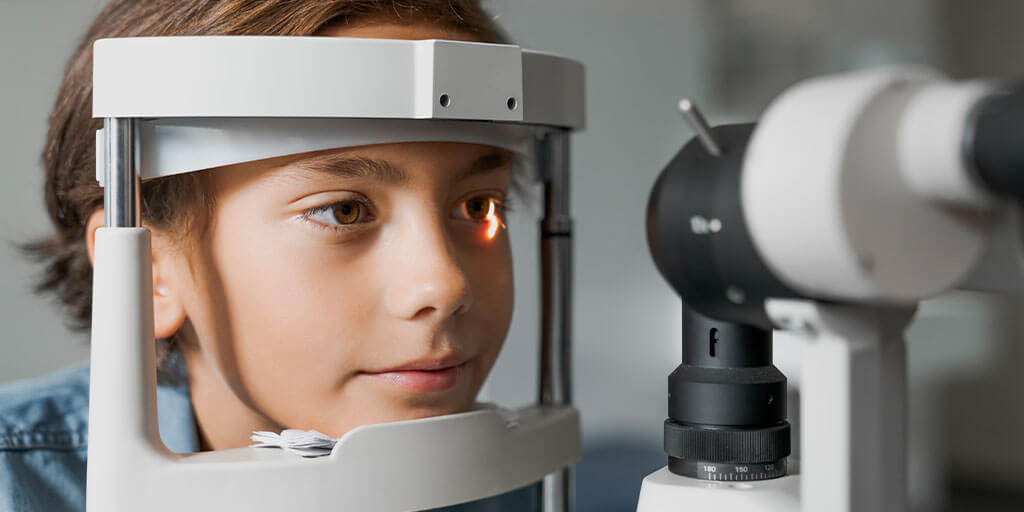When Should My Child Have an Eye Exam?

According to the American Optometric Association (AOA), you should schedule your child's first eye exam at six months of age. Your child's eye doctor will perform tests to ensure your child's eyes are healthy and that there are no problems that might interfere with normal visual development. In addition, the doctor will set your child up with an exam schedule and make recommendations on how you can protect your child's vision.
Scheduling an eye exam at six months can help your doctor identify any possible conditions that could affect your child's vision down the road. (Some common eye conditions in newborns include strabismus, lazy eye and nystagmus.) Vision problems can then either be corrected or treated early on before they worsen as the child gets older.
What Does My Child's First Eye Exam Involve?
Your child's initial eye exam is probably the most simple exam they will ever receive. The main reason for this is that your child's vision is still developing at six months. Therefore, the eye exam typically consists of two assessments: identifying eye conditions and testing eye performance.
Eye Condition Assessment
The earliest stages of sight development are the most crucial and set the precedent for the quality of vision your child will experience as they get older. During these stages, your child's eyes are also vulnerable to different conditions or diseases. Therefore, the eye doctor will check for the following conditions:
- Myopia (nearsightedness): Your child can see up close but not far away.
- Hyperopia (farsightedness): Your child can see far away but not close.
- Astigmatism: An eye is not shaped the way it should be, and everything looks blurry.
- Amblyopia: One eye is weaker than the other.
Eye Performance Exams
The other type of test the doctor performs examines how well your child's eyes perform or respond to stimuli. For instance, the doctor may test how the eyes move. Can your child see up or down, left or right? Do the eyes move smoothly, or do they jerk around? These are basic assessments that indicate whether the eyes can move smoothly in any direction.
The doctor may also check to see if your child's eyes are lined up correctly. Both eyes should be aligned and look in the same direction. They should also move together in sync. Last, the doctor may assess how well your child's eyes react to stimuli such as light and darkness. Are there any sudden reactions or a lack of response to either?
How Often Should I Schedule an Eye Exam for My Child?
If your child's vision is in excellent condition and they do not require any corrective devices (glasses, contacts), then their eye exam schedule will likely look like this:
- Next exam at age 3
- Before kindergarten or first grade (age five to six)
- Every one to two years after age six
If your child is diagnosed with vision problems or requires corrective eyewear, you should schedule annual eye exams. If your child has certain risk factors for eye problems, the eye doctor might recommend more frequent exams, depending on your child's condition.
How to Prepare Your Child for Their Eye Exam
Chances are, if your child is aware that they are going to the eye doctor, they will be less than excited. In some cases, your child may even have a fear of getting an eye exam. While this can be frustrating, it is also understandable: after all, even adults dread doctor visits of any kind. As a parent, there are some things you can do to prepare your child for their first, and subsequent, eye exams.
Let Your Child Know That the Doctor Is There to Help
The optometrist will try to make sure your child feels comfortable and discuss any concerns. If your child is old enough, the optometrist may ask them questions. Otherwise, they will turn to you, as the parent, to see what is concerning you.
During the exam, they will ask your child to name letters and other items. They may also add drops to your child's eyes before performing tests to check your child's vision. Your child should know that all these activities and assessments are to help them.
Explain All Procedures in Advance
When taking your child to an eye exam, tell your child what tests the doctor will run. One of these tests is a visual acuity test. The doctor will see how well your child sees close up and far away during the visual acuity test.
A pupil test will also be done to determine how your child's eyes react to bright lights. During an eye movement test, the doctor will move an object in front of your child's eyes to see what the eyes do. This is what is included in a child's eye exam, and there's nothing to fear. The more you explain to your child, the less fearful they will be.
Remind Your Child How Often Eye Exams Occur
Set expectations by letting your child know how often they should go to the eye doctor. Once they reach the age of six, let them know that they will need an exam every one to two years. That way, they are not surprised when the next exam comes around.
Schedule an Eye Exam at Gulf Coast Vision Center
Keep your child's vision in excellent condition at every stage of their development. To schedule an eye exam at Gulf Coast Vision Center, contact us at one of our convenient locations in Northwest Florida.
